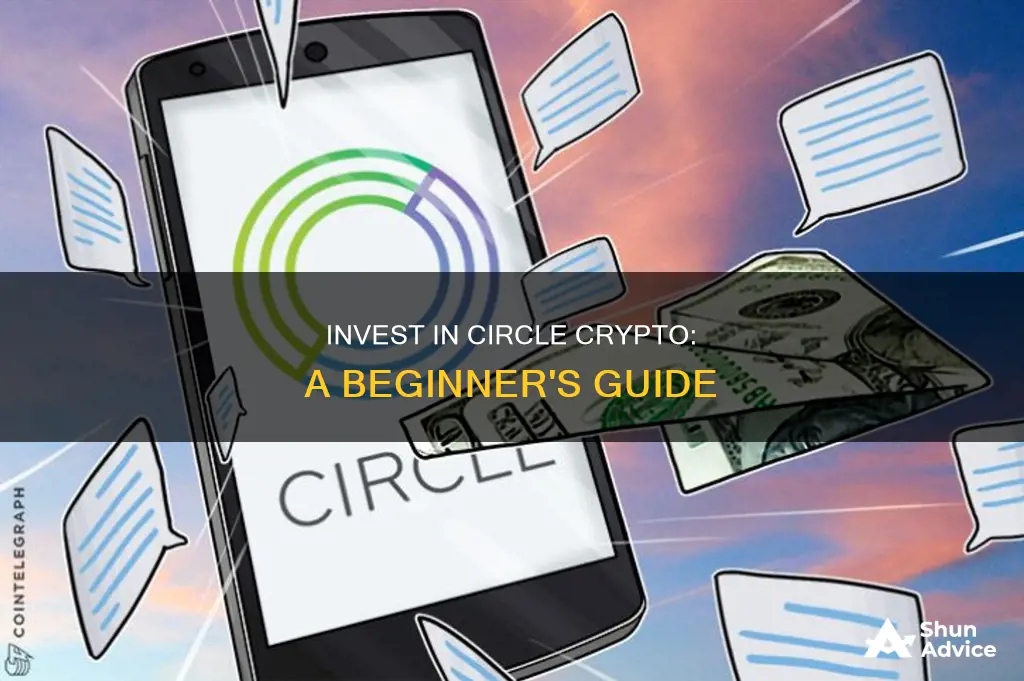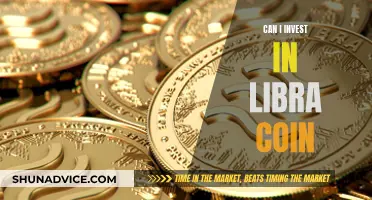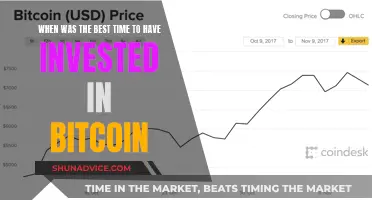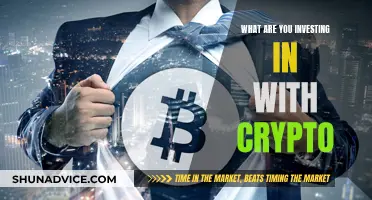
Circle is a digital currency company that was launched in 2013 and is known for the issuance of the US dollar-backed stablecoin, USDC, in partnership with Coinbase. Circle is widely expected to launch a public offering, though no formal announcement has been made as of yet. For investors eager to get started, Sharespot or The Private Shares fund are options to explore, as each holds private equity shares in Circle. Circle Invest is a mobile app from Circle that enables anyone to buy and sell crypto assets, but it is only available for US residents.
What You'll Learn

Circle's IPO and stock price
Circle Internet Financial, the company behind the USD Coin (USDC), the world's second-largest stablecoin by market cap, has filed for an Initial Public Offering (IPO) in the U.S. as of January 11, 2024. The IPO's specifics, such as the share price range, are yet to be revealed, pending review by the U.S. Securities and Exchange Commission (SEC).
Circle's IPO is expected to make waves in the stablecoin market and elevate USDC's position within it. The IPO could bring an influx of resources for promoting USDC and bolstering its competitiveness against its main competitor, Tether USD (USDT). This move towards regaining lost market share could reinforce trust among current and prospective users and expand USDC's utility across a broader array of financial services.
Circle's share of the stablecoin market grew to 23.5% in 2021, second only to Tether. The company has a market valuation of $4.5 billion and is expected to debut on the New York Stock Exchange (NYSE) under the ticker CRCL before the end of 2024.
Circle is a global financial technology firm that enables businesses to harness the power of digital currencies and public blockchains for payments, commerce, and financial applications worldwide. It offers a platform for users to send, trade, and invest in both cryptocurrency and traditional currencies (fiat). Circle is also the primary issuer of Euro Coin (EUROC), a euro-backed stablecoin.
Circle has raised over $1 billion in funding and attracted investors such as Goldman Sachs, IDG Capital, Fidelity, Valor Capital Group, and Digital Currency Group. The company was founded in 2013 by Jeremy Allaire and Sean Neville.
While the IPO's share price is not yet known, potential investors can monitor official company communications and reliable financial news sources for updates. It is important to note that investing in private companies like Circle carries high risks due to limited liquidity and information.
Zoin Crypto: Smart Investment or Risky Gamble?
You may want to see also

Circle's USDC stablecoin
USDC is a stablecoin that is widely used in decentralised finance (DeFi). It is supported by a consortium of companies, including Circle, and is available on multiple blockchain networks, including Ethereum, Solana, and Avalanche. USDC is also supported by major financial institutions such as Visa, Mastercard, and MoneyGram.
One of the key advantages of USDC is its speed and efficiency in facilitating global transactions. USDC transactions can settle in seconds worldwide, every day, compared to legacy payments that can take multiple days. Additionally, global payments can be made for a fraction of the cost, making it an affordable option for sending money internationally.
USDC is also highly trusted and transparent. The reserve composition and monthly attestations are publicly available, providing assurance that USDC is always redeemable 1:1 for US dollars. The USDC reserve is held in cash and short-dated U.S. government obligations, including U.S. Treasuries, which are among the safest and most liquid assets in the world.
USDC is designed to maintain price equivalence to the US dollar, providing a stable store of value. This distinguishes it from other cryptocurrencies that fluctuate in price. As a result, USDC offers a reliable option for businesses and individuals seeking a digital currency with stability and global reach.
Coinbase: A Worthy Investment or a Risky Gamble?
You may want to see also

Circle's business model
Circle is a digital currency company that was launched in 2013. The company is known for issuing the US dollar-backed stablecoin, USDC, in partnership with Coinbase. Circle's primary product, USDC, is a "digital dollar" that is backed by US dollars and holds its value over time. Circle makes money by earning interest on deposits and through transaction fees from a suite of tools and APIs that companies can use to build USDC functionality into their financial systems. Circle offers a range of products, including Circle Accounts, Circle Custody, Digital Asset Payments, Fiat Payments, Programmatic Payouts, USDC Settlements, Circle APIs, and APIs for Web3 Services.
Circle has successfully navigated regulatory requirements and is the most licensed company in the industry. It was the first company to receive New York's notoriously difficult-to-obtain BitLicense. Circle has also established business partnerships with prominent companies, including Coinbase, BNY Mellon, Signature Bank, Visa, Mastercard, and Plaid.
Circle's experienced management team, led by serial entrepreneur Jeremy Allaire, has a track record of success. The company's long-haul experience in the crypto space has resulted in the development of USDC, which has become a hit with over $25 billion in circulation. Circle's regulatory work and compliance set it apart from other crypto companies, positioning it for massive growth and spending as outlined in its investor presentation.
Circle's unique position, combining the attributes of a bank and a tech company, makes it challenging for traditional banks to catch up. The company's access to real US dollars and its suite of tools for crypto transactions give it a competitive advantage in the market.
The Dogecoin Investment: How Much Did You Risk?
You may want to see also

Circle's regulatory work
Circles Regulatory Work
Circle has been working with regulators and paying close attention to the U.S. Securities and Exchange Commission (SEC) guidance. This was stated by Circle's former chief legal officer, Gus Coldebella, who also emphasised the company's advocacy for forward-looking regulatory clarity on digital assets. Circle has also been actively engaging with global regulators to promote permissionless blockchain.
In 2022, Circle became the first major cryptocurrency exchange and wallet service to receive a "Class F" license from the Bermuda government under their Digital Assets Business Act of 2018 (DABA). This license allows Circle to offer a suite of regulated crypto financial services to its international customers, including expanded digital asset product offerings. Bermuda's regulatory framework embraces the unique nature of crypto assets while maintaining its position as one of the strongest regimes for anti-money laundering (AML) and combating the financing of terrorism (CFT), compliant with Financial Action Task Force (FATF) standards.
Circle's CEO, Jeremy Allaire, has also discussed the regulatory environment for the crypto industry and how stablecoins, like USDC, play a unique role in the financial ecosystem. He expressed his belief that the Biden Administration will ultimately be supportive of cryptocurrency due to its potential to be a core building block in America's infrastructure changes.
Additionally, Circle has been filling key legal and compliance roles, such as hiring Flavia Naves as its new general counsel, who has extensive experience with technology, payments, and financial technology companies.
December's Best Cryptocurrency Investment Opportunities
You may want to see also

Circle's long-term growth plans
Circle's open developer platform is a key component of their strategy. The platform provides smart contracts, APIs, and SDKs, making it faster, easier, and safer for businesses and developers to leverage the global reach of blockchain technology. This, in turn, enables cross-border payments, expands global dollar access, and powers global businesses. Circle's USDC is supported on 15+ blockchain networks and can facilitate near-instant settlements worldwide, enhancing its utility for international transactions.
Circle has also expressed its commitment to working closely with regulators to ensure that its digital dollar meets and surpasses the standards for stablecoins. This regulatory compliance is intended to enhance trust and transparency, which are crucial for the long-term sustainability and growth of the company.
Circle's team is comprised of top experts from diverse fields, including finance, technology, and risk management. This diverse expertise positions them well to navigate the complex world of global finance and build a more open financial system.
In terms of financial performance, Circle has demonstrated profitability, reporting a $43 million profit in Q3, with revenue and interest income of $274 million. This profitability is linked to the surging growth of USDC's market capitalization, which has exceeded $50 billion. Circle invests the majority of its assets in short-term, low-risk U.S. Treasury bills, contributing to its financial stability.
Circle's long-term growth strategy is focused on leveraging its USDC stablecoin to revolutionize global commerce, enhance trust and transparency, and create a more prosperous and open financial system.
The Ultimate Guide to Investing Money in Bitcoin
You may want to see also
Frequently asked questions
Circle is a digital currency company that was launched in 2013. The company is primarily known for the issuance of the US dollar-backed stablecoin, USDC, in partnership with Coinbase.
Circle is widely expected to launch a public offering, though no formal announcement has been made as of yet. For investors who don't want to wait, some other options to explore include Sharespot or The Private Shares fund, each of which holds private equity shares in Circle.
USDC is the "digital dollar" that's backed by U.S. dollars. USDC is a stablecoin, meaning it holds its value over time (unlike digital currencies like bitcoin, which are volatile).
Circle is led by Jeremy Allaire, a serial entrepreneur with a track record of success. The company has been around since 2013, which is a long time in crypto years. They have also done regulatory work and applied for money transmitter licenses. Circle is the most licensed company in the industry and has business partnerships with companies including Coinbase, BNY Mellon, Signature Bank, Visa, Mastercard, and Plaid.







